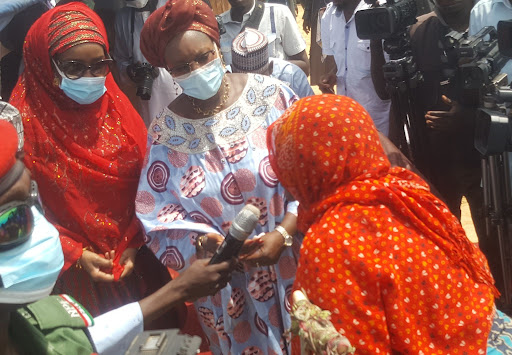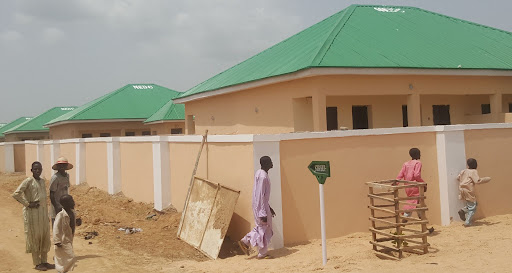Northeast Development Commission Hands Over 1,000 Housing Units Built For IDPs In Borno
The project is part of the 10,000 housing programme approved by the Nigerian government in 2019.

The Northeast Development Commission (NEDC) on Thursday, Sept. 2 handed over 1000 units of two-bedroom bungalows recently completed to the government of Borno State, Northeast Nigeria.
The mass housing was meant to provide alternative permanent accommodation for the Internally Displaced Persons (IDPs) in Borno State. The houses are located in Ngwom in the Mafa Local Government Area of Borno State, a village 20km away from Maiduguri, the state capital.
The project is part of the 10,000 housing programme approved by the Nigerian government in 2019 under the Special Presidential Intervention in Borno State (SPIB).
Ngwom, a patchy agrarian village was displaced following an attack by insurgents after which the entire community was wiped off. In 2018 the United Nations Development Project (UNDP) built and handed over about 200 housing units in Ngwom to the Borno State.
Mohammed Alkali, Managing Director of NEDC, said an estimated N2 billion was expended by the board to construct the 1000 houses alongside the establishment of technical and vocational centres around the state.

Alkali said the 1000 mass housing units consist of four blocks of 2-bedroom bungalows with veranda and courtyard in a cluster arrangement. “Each block sits on 400 Square meters with a perimeter fence and ample space for other home activities,” he said.
He said the 1000 housing units are also fitted with solar-powered street lights, four industrial solar-powered boreholes, planted over 3000 economic trees, and provision made for school, market, police station and motor-park.
“As you can see, we are today delivering a town at Ngwom as against its earlier village status,” the NEDC chief executive said.
According to Alkali, beneficiary IDPs who would soon be moving into their would-be homes are to be given food items comprising 2000 bags of rice, 2000 cartons of spaghetti, and 2000 gallons of vegetable oil.
Other non-food items to be benefitted by the IDPs he said, comprised 5000 pieces of blankets, 5000 mattresses, 5000 mats, 4000 pieces of children wear, 4000 women wrappers, 4000 pieces of mosquito nets, 5000 pairs of slippers, 2000 men brocade, 1000 cartons of antiseptic soaps.
Economic empowerment tools would also be given to the women as they resettle in their new homes at Ngwom, he added.
“The NEDC, with the approval of the Ministry of Humanitarian Affairs, will also distribute livelihood support to the occupants of the house after thorough needs assessment and training.”
“The livelihood support tool to be distributed comprised 1000 cooking stoves, 200 grinding machines, 200 knitting machines, 200 sewing machines and 200 spaghetti making machines.”
General Paul Tarfa (rtd), Chairman Board of NEDC, described the event as “one of the most important projects since NEDC creation.”
“This event is important not for its magnitude but for what it would serve in the areas of provision of accommodation,” Tarfa said.
The retired general said the project for mass housing “commenced last year, and till date not only had we visited the sites many times, but also ensured quality standards in the building of the projects.”
Yusuf A. Yusuf, Chairman of the Senate Committee on Special Duties, during the handing over said the National Assembly approved the budget for the NEDC, “because we believe our brothers and sisters can have a place to lay their head.”
“This is a way to get out of the IDP syndrome. This is the first time we are doing this and Borno state is one of the principal partners in the execution of NEDC projects.”
Edward Kallon, United Nations Humanitarian Coordinator in Nigeria, described the event as “light at the end of the tunnel.”
Kallon stressed that despite the worsening spate of insecurity in parts of the state, the idea of building permanent homes for IDPs is a sign that peace is emerging in the Northeast.
Sadiya Farouq, Nigerian Minister of Humanitarian Affairs and Social Development, and Pauline Tallen,Minister of Women Affairs, commended the NEDC for bringing succour to the people of the Northeast especially the women and children.
Babagana Zulum, Governor of Borno State said the 1000 housing units were just one among the “numerous support the state gets from the Commission and the ministry of humanitarian affairs.”
“Today we are witnessing another support in the series of interventions from Mr President. And this one will go a long way in bringing succour and development to our people,” Zulum said.
The NEDC has also during the event presented certificates to 218 students who were trained on various ICT programmes in the state.
The two ministers had also performed a groundbreaking ceremony for the construction of a 300 seater auditorium for the Center for the Study of Violent Extremism at the University of Maiduguri, as well as the distribution of food and no food items to IDPs.
Falmata Babagana, a mother of four and one of the recipients of the houses at Ngwom said she had lived in an IDP camp for six years before she was recently moved to her new home.
“We thank God for this, and we appreciate the government for wiping off our tears. Now my family and I can sleep without worries about rainwater leaking into our roof or any fire disaster burning our home,” she said.
Support Our Journalism
There are millions of ordinary people affected by conflict in Africa whose stories are missing in the mainstream media. HumAngle is determined to tell those challenging and under-reported stories, hoping that the people impacted by these conflicts will find the safety and security they deserve.
To ensure that we continue to provide public service coverage, we have a small favour to ask you. We want you to be part of our journalistic endeavour by contributing a token to us.
Your donation will further promote a robust, free, and independent media.
Donate HereStay Closer To The Stories That Matter




